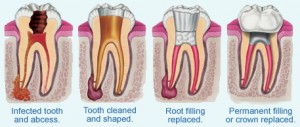Root Canal Treatment
Root canal treatment (also called endodontics) is needed when the blood or nerve supply of the tooth is infected through decay or injury.
Inside every tooth is a nerve and if decay reaches the nerve, or if a tooth fractures then bacteria can induce infection which can eventually lead to an abscess.
Root canal treatment eliminates the bacteria from the root canal and removes the cause of the infection.
The treatment requires accessing the nerve and removing it. The root canals are cleaned and shaped with fine instruments. The canals are finally filled with special materials.
Root canal work is a skilled and time consuming procedure and most courses of treatment will involve one or two appointments of one to two hours duration.
- Does root canal treatment hurt?
You will always be given a local anaesthetic injection when you have any form of invasive dentistry such as a root canal treatment, and what it is worth bearing in mind is that many people are in quite severe pain before having root canal treatment due to the infection or access which is present. Having this treatment then removes the initial cause of pain and so pain relief is the result.
In some instances it may also be possible to offer dental sedation during a root canal treatment, there are various ways that sedation can be offered either by breathing in a relaxing gas or by having an injection which will keep you awake but ensure that you have no conscious awareness of what is going on.
When you come for an initial assessment for anyone root canal treatment therapy and think that you may like dental sedation them please do let your dentist know as appropriate arrangements can then be made.
- Is there pain after root canal treatment?
Normally, as we have mentioned before, pain is actually less after root canal treatment as it deals with the infection and abscess. Sometimes tooth can feel painful after root canal treatment if you bite excessively hard on it, we therefore recommend being careful about what you eat for a few days after having this form of dentistry.
There is often a falsely held belief that root canal treatments are very painful, people have a tendency to believe this because they are actually reporting on the pain that they feel prior to having treatment caused by infection and the abscess. With modern injection techniques and anaesthetics is generally speaking no more painful than a routine filling which is normally described as uncomfortable rather than painful.
The real trick to reducing pain with root canal treatments is to not let the condition get so bad in the first place. There are a few instances where pain can be more after root canal treatment:
- badly inflamed teeth
- if you grind your teeth, known as bruxism
If the gum and connective tissues around your teeth become badly inflamed then it is this that can cause post root canal treatment sensitivity and/or pain. This is why we recommend seeing the dentist as soon as possible to ensure that the information does not build up and cause this type of pain.
If you grind your teeth then this will transfer the pressure onto any inflamed gum and connective tissues around your teeth, so being aware of grinding and clenching will also help to eliminate sensitivity and/or pain after root canal treatment.
How to reduce pain
- Take regular pain killers
- Ask your dentist for stronger pain killers if regular ones don’t have an effect
- Eat soft food fora few days after to allow your gums and teeth time to recover
- Is there any post treatment advice?
Eat soft food for a few days after your root canal treatment, this gives time for the surrounding soft tissue and ligaments to recover after the treatment as it is these which actually cause the pain, and not the tooth. Eating a soft diet transfers less force to these affected areas and therefore keeps pain to a minimum.
In the interim appointments it is also generally recommended to avoid extremely hot or cold foods, this is because the root canals may not be fully filled at the first appointment. Avoiding this type of food will also help to reduce post-operative sensitivity.

